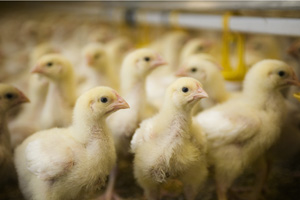Major growth in Saudi Arabian poultry industry

The Saudi poultry sector has experienced a major production growth in recent years, according to a recent GAINS report.
Broiler meat production is estimated at 640,000 MT in 2014, and expected to further increase 9% in 2015. Local broiler production currently covers about 42% of total Saudi Arabia’s consumption needs, estimated at 1.44million MT.
The soaring costs of poultry feed and the high mortality rates in Saudi poultry farms remain the major constraints to expand production. In 2013, Saudi Arabia was the world’s largest importer of broiler meat, with a total of 875,259 MT.
Broiler meat imports are forecast to decline by 10% in 2014, due to the large production of last year and reduced demand by food catering services, as the number of pilgrims visiting Saudi Arabia is expected to be lower this year. Brazil dominated the Saudi poultry import market in 2013, with 79% market share, followed by France with 18%, and the US a distant – third with 3%.
Poultry self-sufficiency
Several years ago, Saudi government stated a strategic goal of achieving full self-sufficiency in poultry meat consumption, a goal that most analysts thought was not practically feasible. Some poultry analysts believe that a more realistic goal of 60% self-sufficiency of poultry consumption would possibly be achievable. Reaching this target, however, would require a huge expansion in Saudi Arabia’s poultry production capacity, high costs of subsidised poultry feed products, and the implementation of a unified biosecurity system to help reduce chicken broiler mortality rates.
In 2013, local poultry meat production covered about 42% of the country consumption needs estimated at 1.44 million MT. The self-sufficiency ration is expected to rise to 46% by 2015.
Source: GAIN report – Saudi Arabia













